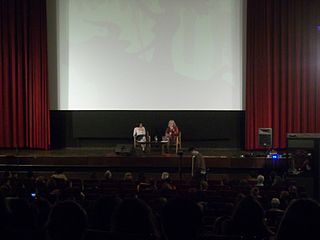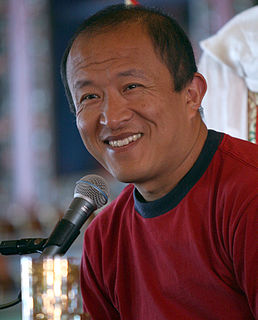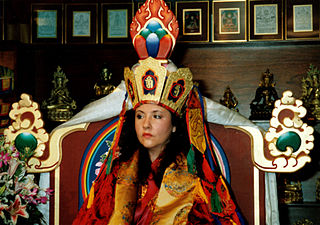A Quote by Sogyal Rinpoche
Once an old woman came to Buddha and asked him how to meditate. He told her to remain aware of every movement of her hands as she drew the water from the well, knowing that if she did, she would soon find herself in that state of alert and spacious calm that is meditation.
Related Quotes
She sat leaning back in her chair, looking ahead, knowing that he was as aware of her as she was of him. She found pleasure in the special self-consciousness it gave her. When she crossed her legs, when she leaned on her arm against the window sill, when she brushed her hair off her forehead - every movement of her body was underscored by a feeling the unadmitted words for which were: Is he seeing it?
She didn’t understand why it was happening,” he said. “I had to tell her she would die. Her social worker said I had to tell her. I had to tell her she would die, so I told her she was going to heaven. She asked if I would be there, and I said that I would not, not yet. But eventually, she said, and I promised that yes, of course, very soon. And I told her that in the meantime we had great family up there that would take care of her. And she asked me when I would be there, and I told her soon. Twenty-two years ago.
But she did not take her eyes from the wheels of the second car. And exactly at the moment when the midpoint between the wheels drew level with her, she threw away the red bag, and drawing her head back into her shoulders, fell on her hands under the car, and with a light movement, as though she would rise immediately, dropped on her knees. And at the instant she was terror-stricken at what she was doing. 'Where am I? What am I doing? What for?' She tried to get up, to throw herself back; but something huge and merciless struck her on the head and dragged her down on her back.
She emptied herself of Fabio and of herself, of all the useless efforts she had made to get where she was and find nothing there. With detached curiosity she observed the rebirth of her weaknesses, her obsessions. This time she would let them decide, since she hadn't been able to do anything anyway. Against certain parts of yourself you remain powerless, she said to herself, as she regressed pleasurably to the time when she was a girl.
Yet there were times when he did love her with all the kindness she demanded, and how was she to know what were those times? Alone she raged against his cheerfulness and put herself at the mercy of her own love and longed to be free of it because it made her less than he and dependent on him. But how could she be free of chains she had put upon herself? Her soul was all tempest. The dreams she had once had of her life were dead. She was in prison in the house. And yet who was her jailer except herself?
She suffers as a miser. She must be miserly with her pleasures, as well. I wonder if sometimes she doesn't wish she were free of this monotonous sorrow, of these mutterings which start as soon as she stops singing, if she doesn't wish to suffer once and for all, to drown herself in despair. In any case, it would be impossible for her: she is bound.
It was not the passion that was new to her, it was the yearning adoration. She knew she had always feared it, for it left her helpless; she feared it still, lest if se adored him too much, then she would lose herself, become effaced, and she did not want to be effaced, a slave, like a savage woman. She must not become a slave. She feared her adoration, yet she would not at once fight against it.
She had always told herself that she did hti job because she wanted to help others; afterall, hadn't Maurice told her once that the most important question any individual could ask was, "How might I serve?" If her response to that question had been pure, surely she would have coninued with the calling to be a nurse.... But that role hadn't been quite enough for her. She would have missed the excitement, the thrill when she embarked on the work of collecting clues to support a case.
I found her lying on her stomach, her hind legs stretched out straight, and her front feet folded back under her chest. She had laid her head on his grave. I saw the trail where she had dragged herself through the leaves. The way she lay there, I thought she was alive. I called her name. She made no movement. With the last ounce of strength in her body, she had dragged herself to the grave of Old Dan.
She licked again, taking her time,even though she didn't need to; her first stroke numbed the bite site. No, this second taste was for her, not him, and there was no lying about that. "I'm starting to feel like a Tootsie Pop, here" he rasped. She couldn't contain a smile. " Yes... how did that old commercial go?" She licked him. "One." She licked him again, and he moaned. "Two." She licked him once more, and his hips came off the bed, "Three.
A friend, who's a psychologist, told me about a patient once: a woman who was well educated, had a good job, a house and a loving husband. "I did everything right in my life," said the woman. "But I'm still not happy." She never did what she herself wanted, but what she believed society expected from her.
Perhaps I will die too, she told herself, and the thought did not seem so terrible to her. If she flung herself from the window, she could put an end to her suffering, and in the years to come the singers would write songs of her grief. Her body would lie on the stones below, broken and innocent, shaming all those who had betrayed her. Sansa went so far as to cross the bedchamber and throw open the shutters ... but then her courage left her, and she ran back to her bed, sobbing.
There was a warmth of fury in his last phrases. He meant she loved him more than he her. Perhaps he could not love her. Perhaps she had not in herself that which he wanted. It was the deepest motive of her soul, this self-mistrust. It was so deep she dared neither realise nor acknowledge. Perhaps she was deficient. Like an infinitely subtle shame, it kept her always back. If it were so, she would do without him. She would never let herself want him. She would merely see.
She was the first person on either side of her family to go to college, and she held herself to insanely high standards. She worried a lot about whether she was good enough. It was surprising to see how relieved she seemed whenever I told her how amazing she was. I wanted her to feel strong and free. She was beautiful when she was free.
Blaire, This was my grandmother’s. My father’s mother. She came to visit me before she passed away. I have fond memories of her visits and when she passed on she left this ring to me. In her will I was told to give it to the woman who completes me. She said it was given to her by my grandfather who passed away when my dad was just a baby but that she’d never loved another the way she’d loved him. He was her heart. You are mine. This is your something old. I love you, Rush


















